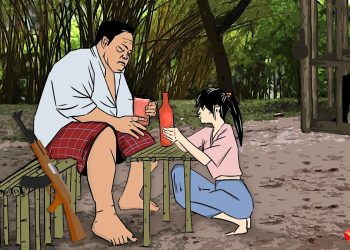The chairman of the Pa-O National Liberation Organization (PNLO) says he remains concerned about the fate of three of his soldiers, who he claims were captured by the Restoration Council of Shan State (RCSS) about one month ago.
“I hope they are freed soon,” the PNLO leader, Khun Myint Htun, told The Irrawaddy.
According to Khun Myint Htun, PNLO Sgt. Khun Mar and two of his subordinates, Khun Aung Tha and Khun Ohn Npe, were detained by RCSS troops in southern Shan State on Aug. 21 while on patrol near Naung Kaung Ki in Mauk Mae Township.
In a recent interview with The Irrawaddy, RCSS spokesperson Sai Ngin claimed that the three PNLO soldiers had switched sides and joined his group of their own free will. “These three soldiers came and joined the RCSS forces, we did not arrest them. If they want to go back home or have a desire to go back to their organization, we are ready to let them go,” he said.
The RCSS, whose armed wing is known as the Shan State Army-South, is one of Burma’s larger ethnic armed groups and has a strong presence in southeastern Shan State, particularly along the Thai border.
Khun Myint Htun rejected the RCSS assertion about his soldiers’ alleged defection, calling the claim “completely not true.” According to the PNLO chairman, the RCSS has made clear to him that his soldiers would be released once a territorial disagreement between the PNLO and RCSS is resolved. Khun Myint Htun said that neither he nor anyone else from the PNLO has been allowed to speak to the three soldiers since their capture.
Relations between the RCSS and the PNLO have been strained in recent years, and exacerbated by the PNLO’s signing of a ceasefire with Burmese authorities in 2012. That ceasefire and another agreement signed in 2013 recognized PNLO claims over parts of southern Shan State that the RCSS also claims as its own. Of particular contention is a new village being constructed for PNLO soldiers and their families called Khanpake in Kadugyi.
Last month the RCSS sent the PNLO two letters ordering them to withdraw from Khanpake and much of the territory that was recognized in the Pa-O group’s ceasefire with the government as being under PNLO control. Khanpake is being built with the permission of government authorities.
Another source of contention between the two groups appears to stem from the fact that many RCSS troops serving in areas near PNLO territory are in fact ethnic Pa-O. Their ethnic identity has caused the RCSS to see the PNLO as a threat, suggested an ethnic Pa-O who spoke on condition of anonymity.
Khun Myint Htun said he remained optimistic that his group, which is significantly smaller than the RCSS, can work things out with its armed neighbors. The two sides are due to meet next month to iron out their differences.
“I hope we can solve this,” Khun Myint Htun said.
During their most recent meeting with the RCSS, Khun Myint Htun and his PNLO colleagues were joined earlier this month by representatives from the Karenni National Progressive Party (KNPP) and the Wa National Organization (WNO). Both groups are allied with the PNLO through the United Nationalities Federal Council (UNFC), a coalition of Burma’s armed ethnic groups. Unlike the PNLO, the RCSS is not a member of the UNFC.
Clashes between RCSS and PNLO forces broke out earlier this month in southern Shan State near where the PNLO soldiers were allegedly captured.
Khun Myint Htun, who won a seat in Burma’s 1990 national election, has a rather unique background that sets him apart from his fellow ethnic rebel leaders. At the time of his victory, the then 26-year-old was the youngest National League for Democracy (NLD) MP-elect.
As with rest of his NLD colleagues, who won an overwhelming 80 percent of the seats in that election, Khun Myint Htun never took office due to the military regime’s refusal to recognize the election results. In 1996, Khun Myint Htun was part of the NLD delegation that walked out of the National Convention tasked with drafting a Constitution, a move that led to his jailing by the military regime for seven years and three months. Shortly after being released in 2003, Khun Myint Htun fled to Thailand where he eventually linked up with the various Pa-O groups that merged to form a reconstituted PNLO in 2009.
Khun Myint Htun severed his ties with the NLD following the dissolution of the exile grouping of NLD members known as the NLD Liberated Area (NLD-LA) in 2012. The former MP-elect turned rebel leader became PNLO chairman in 2013, replacing longtime Pa-O leader Khun Okkar.

















